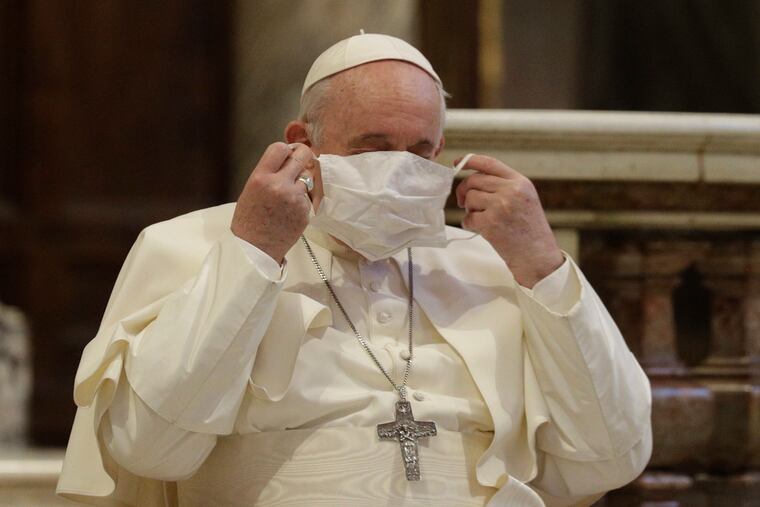Pope Francis plans to get COVID-19 vaccine, says ‘ethically everyone needs to’
Pope Francis says he will soon receive the vaccine, perhaps as early as next week, and called it a duty for everyone. It's a significant pro-vaccine signal to the world's 1.3 billion Catholics.

ROME - In a forthcoming television interview, Pope Francis says that he will soon receive a coronavirus vaccination, perhaps as early as next week, while calling the inoculation a duty for everyone.
“I believe that ethically everyone needs to receive the vaccine,” Francis said in an interview with Italy’s TG5 that will air Sunday.
Francis did not specify the exact timing of his inoculation, but the pontiff said the Vatican's vaccine rollout will begin next week and that he had already booked an appointment.
Francis's plan sends a significant pro-vaccine signal to the world's 1.3 billion Catholics. But it also marks a crucial step in safeguarding an 84-year-old who is missing part of a lung, doesn't like to wear a mask and relishes face-to-face interaction.
Vatican watchers had widely anticipated that Francis would be administered the jab, and he has spoken favorably for months about the international vaccine effort, calling it a light of hope “in this time of darkness.” Until now, though, the Vatican had remained vague on its vaccine plans for the pope. The Holy See only said that its campaign would first target the elderly, medical personnel, and those most in contact with the public.
The Vatican's health director said the city-state will be using the vaccines produced by Pfizer-BioNTech.
» READ MORE: Hundreds of thousands of COVID-19 vaccines haven’t been used in Pa. and N.J. Here’s why, and what’s next
In the upcoming interview, Francis suggested his own perspective on vaccines had been shaped by childhood memories of polio, when "so many kids ended up paralyzed because of this and there was a desperation to receive the vaccine."
"I don't know why some will say, 'No, the vaccine is dangerous.' " Francis said. "But if doctors offer it to you as something that can work, that poses no special risk, why not take it? There is a suicidal denialism that I wouldn't know how to explain, but today you need to take the vaccine."
The journalist who conducted the Friday interview of the pope, Fabio Marchese Ragona, shared a passage of the transcript with The Washington Post.
Almost since the beginning of the pandemic, Francis has seemed to have the vaccine on his radar. In May, he said that the search for vaccines should be "transparent and selfless." And he has said several times that leaders must ensure that vaccines are provided to the poor, the sick and the vulnerable.
Once fully vaccinated with the two doses, Francis - and the church - will still have to behave cautiously. Medical experts say even those vaccinated should wear a mask. But the pontiff can more easily resume some of the activities that have been on hold for nearly a year, such as international travel. Francis is planning a trip in early March to Iraq, what will be his first venture outside of Italy since the start of the pandemic.
» READ MORE: Are we at the beginning of the end of COVID-19? The tricky road to herd immunity, explained.
Francis, who complained of feeling "caged" during Italy's initial spring lockdown, has made it clear that he does not want to be a Zoom-only pope. As that initial clampdown loosened, Francis tried to reclaim the parts of his papacy he seemed to miss the most, mixing to a greater degree with crowds and meeting with pilgrims. Even amid Europe's second wave, Francis has continued to host groups and hold in-person meetings.
Francis's resistance to mask-wearing has perplexed some inside the church, and by forgoing masks in meetings, he is bucking the Vatican's own safety protocols. Neither he nor the Vatican has offered an explanation for his decision to generally go mask-free.
The pope's inoculation will hardly mark the first instance of church vaccine endorsement. Last month, the Vatican's doctrinal watchdog said it was "morally acceptable" for Catholics to receive the vaccines that have used cell lines derived from aborted fetuses. Before that guidance, several U.S. bishops had suggested such vaccines were immoral.
“From the ethical point of view,” the Vatican said, “the morality of vaccination depends not only on the duty to protect one’s own health, but also on the duty to pursue the common good.”
» READ MORE: How to sign up for a Philly COVID-19 vaccine alert that will tell you it’s your turn